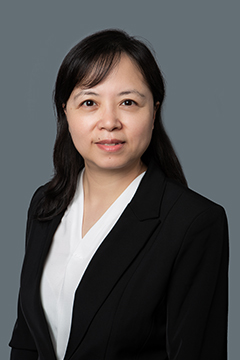
Associate Professor
Department of Pathophysiology & Laboratory of Functional Medicine
West China School of Basic Medical & Forensic Medicine,
Sichuan University
Address:
Room 508, Forensic Medicine Building, No.16 Section 3, Renmin South Road, Chengdu, Sichuan, P.R.China
Phone Number: 86-18215567342
Email Address: wangyufang@scu.edu.cn
Our overarching goal is to understand the role that immune response plays in the development and progression of colorectal cancer and to discover the novel anticancer treatment strategies. Colorectal cancer is one of the major cancer types for which new immune-based cancer treatments are currently in development. And the specific mutations modulate their respective signaling pathways to affect colon cancer initiation, progression, and metastasis. The main focus of our lab is to explore the new targeted and immune-based therapies to improve cancer treatment. We are working on inducing antitumor immunity, along with gene target therapy and conventional chemotherapy.
The directions of our research include: 1) discovering the molecular and cellular network which regulate the immunogenic cell death; 2) understanding how KRAS mutations affect CRC therapy, in particular targeted therapy, and how to overcome mutant-KRAS-mediated therapeutic resistance.
Education and Training
1. 9/2001-7/2004 Ph.D. candidate, Sichuan University
2. 7/1999-present: Lecturer, associate professor. Sichuan University, Chengdu, Sichuan.
3. 6/2006-7/2011: Research fellow, Massachusetts General Hospital Cancer Center, Harvard Medical School, Boston, Massachusetts, U.S.A
4. 11/2004-10/2005: Visiting Scholar, Newcastle University, Newcastle, Australia
Area of Interest
Target therapy of tumor, especially colon cancer and lung cancer; inflammation related cancer
Selected Publications
1.Du J, Wang Y, Chen D, Ji G, Ma Q, Liao S, Zheng Y, Zhang J, Hou Y. BAY61-3606 potentiates the anti-tumor effects of TRAIL against colon cancer through up-regulating DR4 and down-regulating NF-κB.Cancer Lett.2016 Dec 28;383(2):145-153. (IF5.992)
2. Wang Y, Lv J, Cheng Y, Du J, Chen D, Li C, Zhang J. Apoptosis Induced by Ginkgo biloba (EGb761) in Melanoma Cells Is Mcl-1-Dependent.PLoS One.2015 Apr10;10(4)(IF3.73)
3.YuFang Wang, Sergia Velho, EfseviaVakiani, Gerald Chu, James Bugni, Channing Der, Mark Philips, David Solit, and Kevin Haigis. Glickman Kevin M. Haigis. Mutant N-Ras protects colorectal cancer cells from stress-induced apoptosis and contributes to cancer development and progression.Cancer Discovery.2013 Mar;3(3):294-307(IF20.01)(B)
4.Ji Zhang, Diane E. Handy, Yufang Wang, Guylaine Bouchard, Jacob Selhub, Joseph Loscalzo, Martin C. Carey. Hyperhomocysteinemia from trimethylation of phosphatidylethanolamine during cholesterol cholelithogenesis in inbred mice. Hepatology (IF 11.1)2011 Aug;54(2):697-706(C)
5.Pamela K. Kreeger, Yufang Wang , Kevin M. Haigis, Douglas A. Lauffenburger.Integration of Multiple Signaling Pathway Activities Resolves K-RAS / N-RAS Mutation Paradox in Colon Epithelial Cell Response to Inflammatory Cytokine Stimulation.J. IntegrBiol (Camb).2010 Apr 7;2(4):202-8(IF1.944)(F)
6. Kevin MH, Krystle Rk, Yufang Wang, Ann Cheung, Marcia C. Haigis, Jonathan N. Glickman, Michiko Niwa-Kawakita, Alejandro Sweet-Cordero, Judith Sebolt-Leopold, Kevin M. Shannon, Jeffrey Settleman, Marco Giovannini, Tyler Jacks.Differential effects of oncogenic K-Ras and N-Ras on proliferation, differentiation and tumor progression in the colon.Nature Genetics2008; May;40(5):600-8. (IF29.4)(B)
7. Wang YF, Jiang CC, Kiejda KA, Gillespie S, Zhang XD, Hersey P. Apoptosis Induction in Human Melanoma Cells by Inhibition of MEK Is Caspase-Independent and Mediated by the Bcl-2 Family Members PUMA, Bim, and Mcl-1.Clin Cancer Res. 2007 Aug 15;13(16):4934-42. (SCI 8.7)(C)